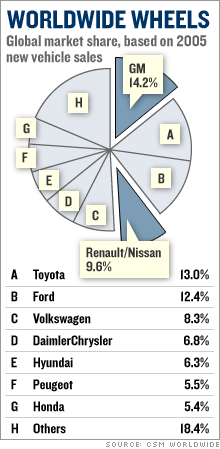Better financial news at GM (Charts) seems to have lessened the pressure on management at the nation's No. 1 automaker to do a deal, a move which was encouraged by the company's No. 1 individual shareholder, Kirk Kerkorian. GM reported an unexpected profit, excluding special items, from its core auto business in the second quarter, as it trimmed North American losses by $1 billion from a year earlier. "GM didn't seem very interested in the alliance. (CEO Rick) Wagoner made it clear it was forced upon the company," said John Casesa, managing partner Casesa Strategic Advisors. "I think events have lessened pressure on GM management, particularly the second quarter results they can point to as a sign their plans are showing improvement." When the GM-Nissan-Renault talks were first getting underway, the idea of a combination was the center of attention in the industry. It even sparked talk that Toyota Motor Corp. (Charts) might seek to enter its own alliance with GM. But in the last two months, the talks have gotten relatively little attention, as officials with GM and Nissan (Charts) refused to comment on the status of discussions during the 90-day review period, which started July 14. Some experts say that just because things have been quiet, doesn't mean there won't be some kind of agreement between the companies. "The people I know involved in it are working very seriously," said David Cole, chairman of the Center for Automotive Research, an auto industry think tank. "It's not something they're blowing off and just putting in the time." But even Cole says he would be surprised if what emerges is a significant combination, with the automakers agreeing to hold equity in each other's company and sitting on each other's board, the way Nissan and Renault already do. "There are areas, like powertrain research and development, where a joint venture would make sense, because of the very high cost of powertrain technology," Cole said. "The pressure in the industry to find synergies has not lessened. That is going to drive a real escalation in the number of alliances and partnerships." Is Ford a better partner for Nissan-Renault? Several industry experts say they have thought all along that also-embattled Ford Motor Co. (Charts) would be a better fit to join the Nissan-Renault alliance than would GM. And during the last two months, Ford Chairman Bill Ford Jr. has gone on record saying his company is open to joining unspecified industry alliances. Frederique Le Greves, spokeswoman for Nissan North America, said Nissan has not been exploring any other potential alliances while discussions have been taking place with GM. "When we see whether it's a go or a no-go, we can consider other partners," she said. But last week Ford named Boeing (Charts) executive Alan Mulally as its new CEO, and several industry experts say they think that makes Ford less likely to explore its own deal with Nissan-Renault, at least in the short-term. "Any assumption we had about Ford's willingness, we have to suspend until Mulally gets settled," said Casessa.
And other observers point out that with Ford expected to announce details of additional cost-cutting moves in the coming weeks, if not days, this is probably the wrong time for Ford to enter into alliance talks. "The situation at Ford is pretty volatile," said Mike Jackson, director of North Ameircan Vehicle Forecasts for consulting firm CSM Worldwide. "Certainly there are some scenarios that might involve Renault-Nissan, but I have to think they fall low on the priority list." Similarly, many of the industry experts say they don't think it's a bad thing for GM if the talks with Nissan-Renault go no where. They say despite recent progress, GM executives still have a lot on their plate. They must move ahead with plans to close plants, roll out new models and negotiate a new labor pact with the United Auto Workers to replace the one that ends a year from now. "An alliance would probably have proven more of a distraction," said J.D. Power's Schnorbus. "The current conditions at GM probably lifted the pressure and makes it easier for them to walk away from the deal. And that lets them get back to what they need to be doing, concentrating on their cost structure and their product." The incredible shrinking car companies 
| 
